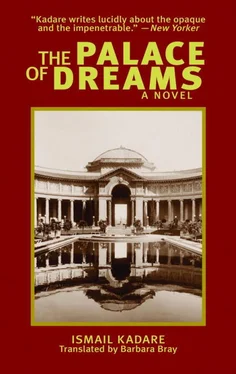Mark-Alem had asked what he meant by “The State protects them,” and the proprietor, who was expecting the question, told him a truly amazing story. The blind men who came to his café hadn’t lost their sight through illness, accident, or war. If that had been the case he would have welcomed them gladly. But the cause of their blindness was different, and very difficult to comprehend. They had never suffered from any physical infirmity, and at one time could see, but their eyes, unlike other people’s, had a baneful effect. And so, as Mark-Alem must know, the great Ottoman State, in order to defend itself and protect the rest of its subjects, decreed that these people were to have their eyes put out. And by way of compensation the State in its mercy awarded them each a pension for life.
“So now do you see why I can’t throw them out of my café? Goodness knows who they take themselves for! They’re proud of their sacrifice—probably take themselves for heroes!”
Mark-Alem hadn’t known anything about this decree, and at first regarded the proprietor’s story, which he probably repeated to every new client, as the creation of a deranged mind. But on looking into the matter he found the decree did exist, and that it was put into practice throughout the Empire.
Strangely enough, in spite of their black bandages, Mark-Alem didn’t find them frightening anymore. There, in theTabir, he had read about all kinds of terrifying looks, and he thought of those eyes now in their supreme horror, opening not out of human brows but out of the edge of the sky or the deepest heart of the mountains, and lighted sometimes by a sliver of moon like a waxen stalactite.
Neither the denunciation of people with the evil eye, which had horrified Mark-Alem when the café owner first told him about it (for anyone could write a letter accusing someone else of this offense); nor the monthly meeting of a government committee to decide which of the wretches who had been arrested really did have the evil eye and were to have it put out; nor even the cruelty itself, referred to as “in the public interest” in the traditional speech delivered to those who had just been blinded—none of these things horrified Mark-Alem now as they had done in the past. Sometimes he found himself thinking that a few years hence neither the wonders nor the horrors of this world would have any effect on him; they were, after all, pale copies of the wonders and horrors there, in the Tabir, which had succeeded in crossing the frontiers between this world and the other. Hell and heaven are indistinguishable there, he observed whenever he heard anyone say, “How wonderful!” or “How horrible!”
The door of the café opened, admitting some officials from the foreign consulate opposite. They still come and have coffee here, thought Mark-Alem. The acrobat’s table fell silent for a moment. In the old days Mark-Alem, too, used to be rather thrilled when foreigners came into a place where he was, and used secretly to admire their European dress. But now, strangely, he found even foreigners devoid of mystery.
This was the time of the morning when the café was at its most crowded. Mark-Alem recognized some of the staff of the Vakoufs’ [1] Members of the Muslim clergy.
Bank, which was no more than a stone’s throw away. Then the policeman who’d just got off traffic duty came in. The next customers were people Mark-Alem didn’t know. Stifled laughter arose from the acrobat’s table. Laugh away, he thought. For frivolous fellows like you, the world is a bed of roses.
But then, suddenly, like a dark cloud, there came back to him the dinner party two days before at the house of his powerful uncle, the Vizier. Mark-Alem hadn’t seen him for nearly a year, and he’d trembled, as always, when he got home from work and saw his carriage with the Q on the doors waiting outside the house. But he’d been even more shaken to learn from his mother that the Vizier had sent the carriage to fetch him, and was waiting to see him.
Although the Vizier had greeted him warmly, Mark-Alem thought he looked tired and morose. His eyes were dull, as if he’d slept badly. As for his speech, it was full of pauses, and he seemed to be swallowing most of what he had to say. The worries inherent in power, thought Mark-Alem. His uncle asked him about his work, and he, at first with some awkwardness and then more and more freely, started to describe its various aspects. But the Vizier listened absently, and seemed to be thinking of something else. Soon, when Mark-Alem thought he’d just told him something interesting, he blushed to realize that not only was his uncle aware of everything that went on in the Tabir Sarrail, but he knew much more about it than all the people who worked there. The Vizier then talked to him about it, speaking in a slow voice, with many pauses, and leaving many things unexplained. Nevertheless, Mark-Alem learned much more about the Tabir Sarrail in those few minutes than in all the time he’d worked there.
They were alone—something that had never happened before—each with a cup of coffee in front of him, and Mark-Alem still didn’t know why his uncle had sent for him. He was still talking in a low voice, every so often poking at the coals in the brazier, which appeared to interest him rather more than Mark-Alem did. The Vizier spoke about the Quprili family’s relations with the Palace of Dreams. As his nephew might have heard, these relations had been extremely confused for some hundreds of years. It looked as if he was about to add something, perhaps about the Quprilis’ feverish efforts to abolish the Palace of Dreams, but apparently he changed his mind, for he sat silent for some time, clutching the poker nervously and prodding at the coals.
“It’s no secret to anyone,” he said finally, “that a few years ago the Tabir Sarrail was under the influence of the banks and the owners of the copper mines, whereas more recently it has grown closer to the Sheikh-ul-Islam faction. What of it? perhaps you’re wondering. Well, it’s of the greatest importance! It’s not for nothing that one hears it said everywhere nowadays that whoever controls the Palace of Dreams possesses the keys of the State.”
Mark-Alem had indeed heard talk on this subject, but never anything as outspoken, and certainly not from the lips of so senior a government figure. He was taken aback, and as if all that wasn’t enough, the Vizier went on and asked him if he knew what became of the myriads of dreams that were examined in the Tabir Sarrail. Mark-Alem, red in the face, shrugged and said he didn’t know. He was so mortified he’d have liked to sink through the floor. As a matter of fact, he had occasionally asked himself the question, and had naively supposed that once the Master-Dream had been selected, like wheat from chaff, all the useless dreams were bundled up and sent down to the Archives. But as soon as the Vizier asked the question, he told himself it was absurd to think such a mountain of dreams, after having produced the rare flower of a Master-Dream, would just be discarded. Now the Vizier explained that while the choice of a Master-Dream was the main task of the section concerned, hence its name, it was not its only function. The Master-Dream officers were also required to write notes alerting the main institutions of the State to matters of interest, as well as reports and other secret studies on such subjects as the psychoses from which the various classes and races of the Empire suffered.
Mark-Alem drank in his uncle’s words. Naturally, the Vizier stressed, the Master-Dream was of prime importance, especially at times like this, and above all as regards their own family. He stared at his nephew for some time, as if to make sure he really understood that the Quprilis had never been concerned with ordinary dreams, but only, almost exclusively, with Master-Dreams.
Читать дальше












